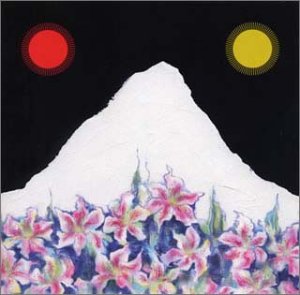Let's look at the song itself today.
Some of you might have already known, but please allow me to write about what this song is all about in details.
"The Madder Red Setting Sun" (Akaneiro No Yuuhi) was first released in Fujifabric's 1st mini-album, "A la Carte" in 2002. In 2004, it was rearranged and released in their pre-debut album, "A la Morte", and again in September 2005 in their 2nd album "FAB FOX".
Therefore, there are three different arrangement of the song available.
It shows that Fujifabric has a special attachment to this particular song and we can also see clearly how their rich instrumental flair has developed over periods of time.
In his interview in FAB BOOK (The first Fujifabric's artist book - including articles on the music magazine, CD-DL Data, photos taken in Fuji Q Highland in Fujiyoshida City ,Mr. Shimura's hometown, each member's personal history, etc. Available only in Japanese language. FAB BOOK ), Mr. Shimura talked, "Two seasons, a spring and a summer, passed since I came up to Tokyo from my hometown. At that time, I was struggling everyday but I was relieved by many pieces of wonderful music. So, I wish not only rock fans but also ordinary people, including university students, to listen to this song, who are in a similar situation to mine."

On the 31st May 2008, the most amazing concert of Fujifabric was held in Fuji Goko Cultural Centre in Fujiyoshida City, and many fans can still recall the most beautiful performance of The Madder Red Setting Sun. Please also refer to This post on 8th Oct for details of Japanese people's feeling towards sunset.
In an Urban city, Tokyo, remembering somethings of the hometown.
Many memories come up in his mind one by one.
Those were "walking on the street nobody was around, on that Sunday morning when my heart was clear", "you, my first love", "helpless feeling of sadness", and the feeling of desolation used to have in childhood" and so on.
The traditional Japanese worldview, the feeling of nostalgia at sunset.
Mr. Masahiko Shimura, who is a main songwriter, guitarist and vocalist of Fujifabric went to one of the most famous high schools in Yamanashi Prefecture. He was in the top set of students in the school, too. Why did he want to be a musician?
An artist is a fantastic job to make people be moved, but from the occupational point of view, it is also true that it is "unstable" compared to other jobs. Even he/she does their best to perform what he/she believes artistic, the society might not highly value his/her art. No idea when his/her art will be understood...
There is a case that the society does not accept his/her art for the rest of his/her life, and if not highly evaluated by society, a stable income cannot be expected. In a countryside like Yamanashi, people still assume that the eldest son will be the next leader of the family, following the tradition of Japanese culture.
Why after all did Mr. Shimura wanted to be a musician?
Why didn't he choose to go to a good university with his good school report from his high school?

He explained his reason that, "By looking at adults around me, who were always moaning that they are bored, I just did not want to be one of them. I didn't want to lead a boring life without making much efforts."
Graduates a high school, gets into a good university, gets a so-so job and work till retirement...
He could see himself being contented what he is without efforts in the future.
That's why Mr. Shimura chose the harder way of being a musician, in which he can devote his life even with a lot of hardship.
He takes the life very serious and he is such an assiduous man.
The Japanese society does not consist of rational individualism.
If things did not go well, you cannot just go back to your hometown - not as simple as that.
In a countryside, the traditional way of Japanese life can be observed more, and the sense of shame is one of them. Satsuma (the old name of Kagoshima Prefecture) was famous for it, but when someone did something wrong, and not that was not acceptable in the society, the sin is not inflicted on him/her only. It will be the "shame" of everyone in the family and relatives who share the same surname.
To avoid such a case, the person who did something wrong (in this sense, not only crime but also something in the sense of morality) commits hara-kiri begging for mercy from the government and society.
The maintenance of high security in Japanese society is no comparison to other developed coutries, and this is due to the mutual effect between the traditional sense of beauty in "shame" explained above and Confucianisn imported from China, according to Dr. Donald Keene.
Things can be physically done, but never be accepted mentally by the society.
This kind of tradition still remains in Yamanashi, I feel.
The virtue of filial piety and the sense of "shame" must affected a lot on Mr. Shimura, and he must have suffered from so much hardship that he could not confess to anyone.
He went up to Tokyo being full of hope, but things did not go as well as he expected.
At that time, he remembered his hometown, Fujiyoshida City in Yamanashi, and made this song.
Continued to tomorrow.

No comments:
Post a Comment